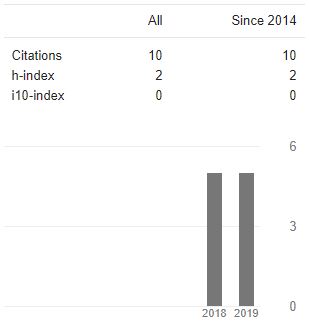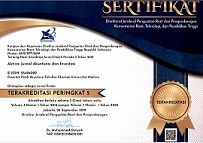NILAI-NILAI ISLAM DALAM UPAYA PENCEGAHAN FRAUD
Abstract
Keywords
Full Text:
PDFReferences
Ash Shiddieqy, Teungku Muhammad Hasbi. 2000. Tafsir Al Qur’anul Majid An-Nuur 1. Semarang: PT Pustaka Rizki Putra.
Abdul Jabbar, S.F. (2012) Insider dealing: fraud in Islam?, Journal of Financial Crime, Vol. 19 Iss: 2, pp.140 –148.
Abd. Wahab, N. & Abdul Rahman, A.R. (2012) Efficiency of Zakat Institutions and Its Determinants, 8th International Conference on Islamic Economics and Finance, Doha, Qatar
Arowosaiye, Y.I. (2008). Economic And Financial Crimes and ICT Infrastructure: The Islamic Criminal Law Perspectives. 3 rd International Conference on Postgraduate Education.
The Commitee of Sponsoring Organization of the Treadway Commission. (2004) Enterprise Risk Management Integrated Framework.
Chapra, Umer. 2000. “Is It Necessary to Have Islamic Economics?” Journal of Socio
Economics, Vol. 29, 21-37.
Al- Qur’an dan Terjemahannya. Departemen Agama RI, 2009
Amrizal, 2004, Pencegahan dan Pendeteksian Kecurangan Oleh Internal Auditor, http://www.bpkp.go.id/unit/investigasi/cegah_deteksi.pdf
Tuannakotta, M.Theodorus, 2007. Akuntansi Forensik dan Audit Investigatif, Edisi I,Lembaga Penerbit Fakultas Ekonomi UI, Jakarta.
Al-Qaradhawi, Y. (2001). “The Lawful and the Prohibited in Islam”. Cairo: Al-Falah Foundation of Translation, Publication and Distribution.
Association of Certified Fraud Examiners, 2004, Report to the Nation: Occupational Fraud and Abuse, Austin, TX.
Riduan Simanjuntak, Ak, MBA, CISA, CIA. “Kecurangan: Pengertian dan Pencegahan” (diunduh dari www.asei.co.id/internal/docs/AseiKecurangan.docs); [05/02/12]
Badri, Muhammad Arifin. 2009. Prinsip Jual Beli dalam Ajaran Islam. www. www.pengusahamuslim.com/fatwa-perdagangan/hukum-hukum-perdagangan/552 prinsip-jual-beli-dalam-ajaran-islam.html
Mohamad, Shamsiah. 2002. Ciri-Ciri Keuntungan Menurut Perspektif Islam. Jurnal Syariah 10: 1 121-137
Perwataatmadja, Karnaen. 2002. “Paradigma Sistem Ekonomi Islam: Suatu Pengantar Kajian Sejarah. Jurnal Ekonomi Syari`ah Muamalah, Vol. 1, No. 1, 43-51.
Harahap, Sofyan Syafri. 2002. “Riset Akuntansi Islam”. Jurnal Ekonomi Syari`ah Muamalah, Vol. 1, No. 1, 103-116
DOI: http://dx.doi.org/10.53712/aktiva.v1i2.143
Refbacks
- There are currently no refbacks.
Indexing:
Member Of:
Reference Manager:
Published by Prodi Akuntansi Fakultas Ekonomi Universitas Madura
Jl. Raya Panglegur Km 3,5 Pamekasan
Phone: (0324) 322231
website: http://ejournal.unira.ac.id/index.php/jurnal_aktiva/index
Email: jaa.unira@gmail.com
AKTIVA by Universitas Madura is licensed under a Creative Commons Attribution 4.0 International License.












